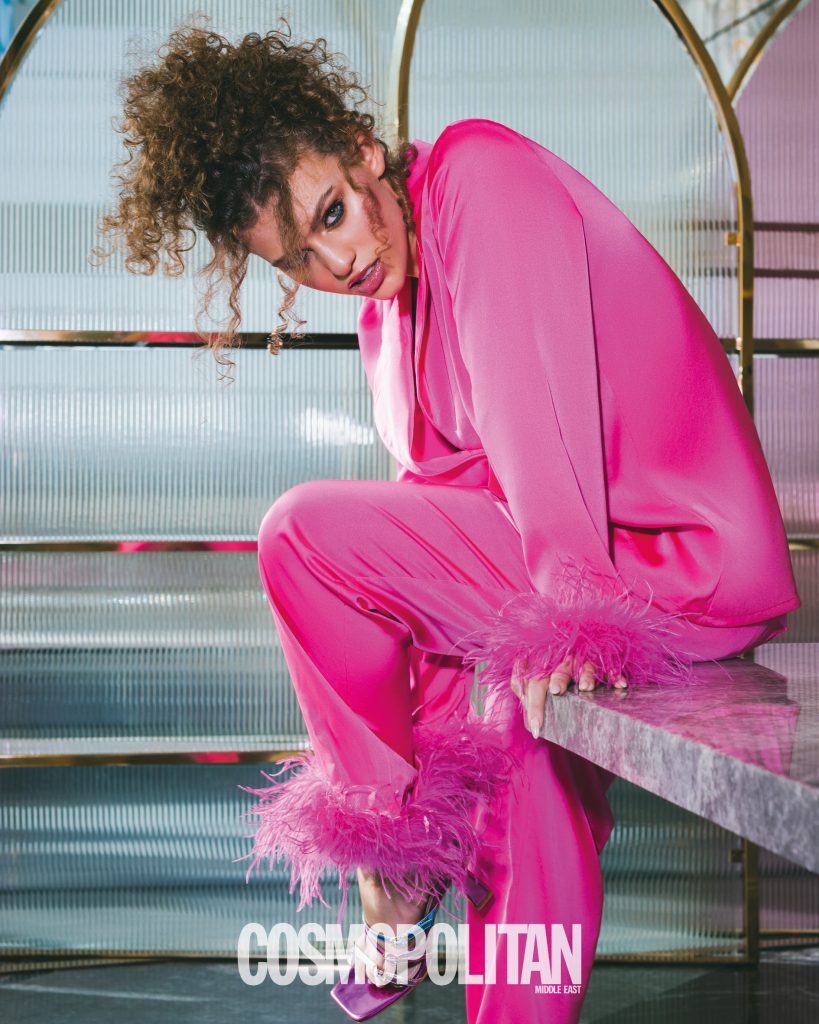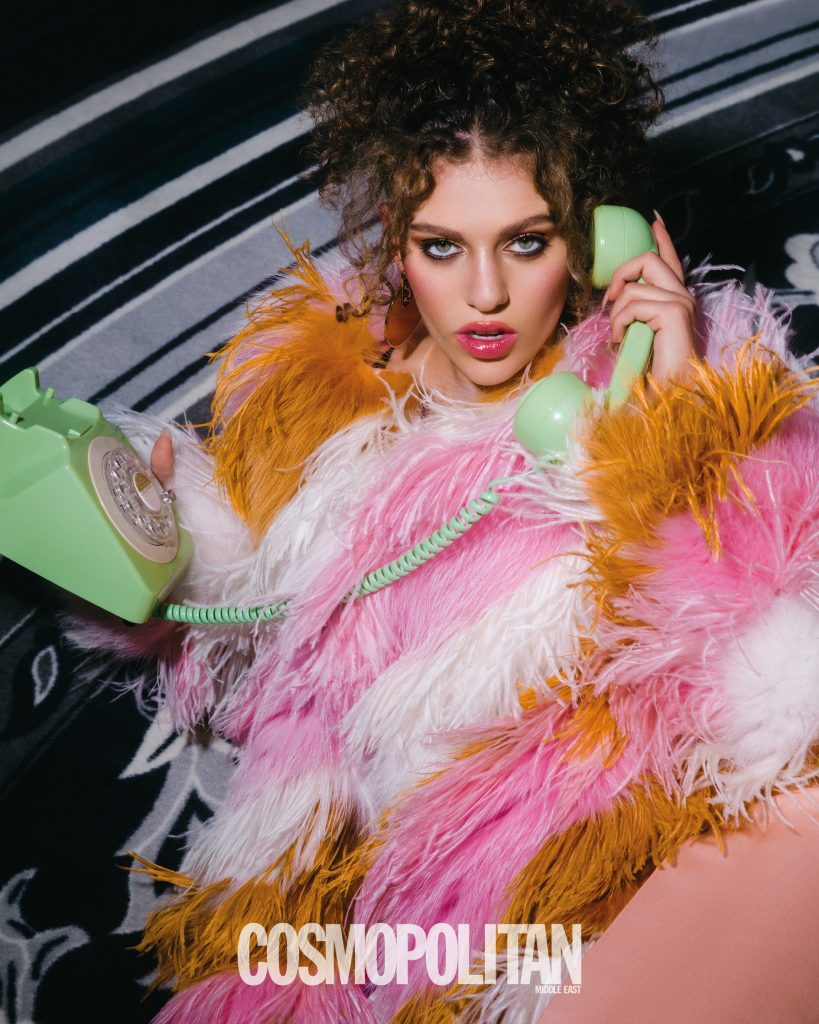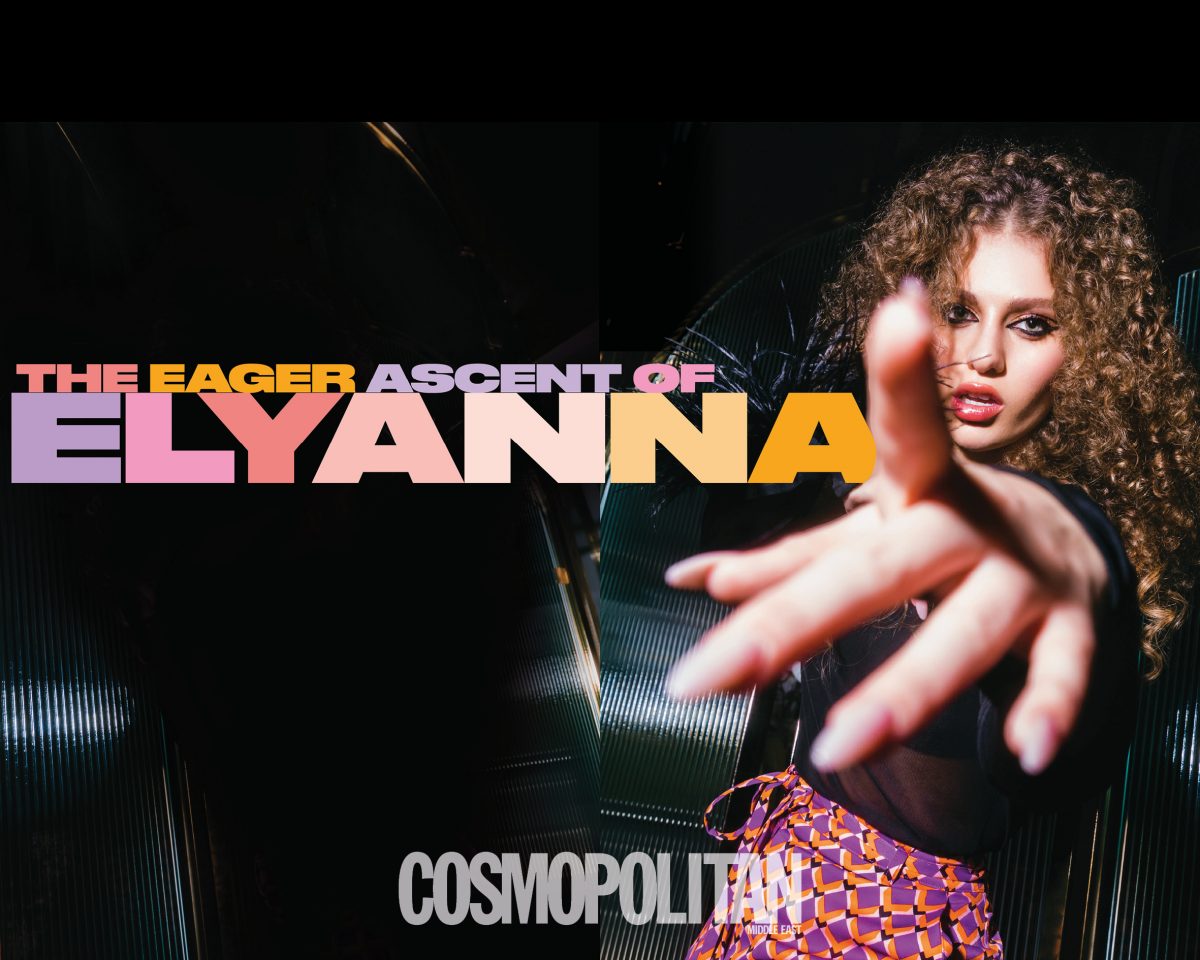Not everyone is privy, but there’s a formula to becoming a successful musician. It involves a good amount of talent, a dose of attractiveness, a hint of luck, and discipline too. The world of K-Pop seems to have gotten it down to a science. It’s common knowledge now the likes of BTS and Blackpink have been carefully curated—meticulously crafted, even.
But we’re in the Middle East, and whilst the region’s most iconic pop artists—the Nancys and Haifas—certainly had a helping hand from loosely structured labels and management, their ascent doesn’t come close to the kind that involves the rigorous training of a K-Pop idol. In any case, these days it’s mostly the Arab world’s homegrown and independent artists who are dividing up the region’s attention. Then, there’s Elyanna.
“I’m in LA and it’s sunny and beautiful, where are you?” she asks as she hopped on the Zoom call. Her smile grows wider as I tell her I’m in Tunis, where she’ll visit for the first time for a performance with Tunisian rapper Balti later this month. Elyanna is wearing a vibrant pink shirt paired with blue earrings. She’s bright eyed and seemingly well-prepared for me to divulge into her life and career.
The 20-year-old singer, born Elian Marjieh, seems to have come close to cracking the underhanded codes of the industry. Even more remarkable, Elyanna has made strides in a region that’s yet to fully build out its music industry’s infrastructure. Naturally, it’s her Arab heritage and Arabic lyrics that have assured her a connection with a Middle Eastern and North African audience. The fact that she’s based miles away in Los Angeles reveals an added layer of effort that have made that possible, though.
Of course, it’s the richness of her voice and the dexterity of her range that earned Elyanna a level of success at such a pace. But as the K-Pop machine has taught us—there are other elements too.
By most global beauty standards, Elyanna is stunning. Her hair is long and blonde, and she proudly styles it curly. She’s also objectively cool, having mastered the art of appearing effortless. This is evident through the grainy selfies nestled between Instagram posts of magazine covers and photo-ops at industry events. Her sartorial choices that steadily oscillate between trendy and self-expressive likely help reel in a young and globally-connected fanbase, too.

Top & trousers by Nadine Marebi. Shoes by Yoox
But again, the formula of success isn’t complete without talent—and well-curated public images aside, she isn’t short of it. Since Elyanna emerged onto the scene in 2020, her voice has been compared to Rihanna and Shakira—something she tells me she’s honoured by, although she hopes to soon be identified solely through her own sonic abilities.
“I don’t mind it,” she says in reference to the comparisons. “These are two really amazing artists,” she adds before opting to describe her singing style as “a taste of the Middle East.”
To anyone who has heard it, her voice is indeed distinctly Arab. And it can be heard in the two EPs she’s dropped so far. The bodies of work were released under the label Empire Records and with the guidance of SALXO, the management company spearheaded by Lebanese-Canadian music executive Wassim Slaiby, who is notably behind the success of The Weekend, and other artists such as Cosmopolitan Middle East cover star Doja Cat, Nicki Minaj, and French Montana.
The eponymous debut EP, which was released in February 2020, “was very random,” according to Elyanna. “I had never been in a studio until then,” she admits. “Writing songs was new to me and so was singing in Arabic, but I went for it blindly and it worked.”
The EP came a few years after Elyanna, who is of Palestinian-Chilean heritage, moved from her native city of Nazareth to the cosmopolitan Los Angeles with her family. “It’s a representation of who I am because it felt like I was explaining who I am and where I came from,” she says. “And indeed, every track was personal, with ‘Oululee Leh’ and ‘Majnony Ana’ having been written alongside her brother and her mother.
“My mom is a writer and my grandfather writes poems. We write music together. It’s very such a fun experience to do that,” she says. She also frequently collaborates with her brother Feras Marijeh, who also directed the music video for ‘Oululee Leh.’ Her sister, named Tali, designs clothing, which she wears frequently. If these pieces of information were to establish an additional detail to Elyanna’s trajectory, it’s that her career was by no means an accident. As it turns out, her family uprooted their life in Palestine in support of her career. At the time, Elyanna was 15 years old—and they first landed in San Diego. “I was really just looking forward to doing what I want to do, which is music. I had one goal and that was it,” she says.
“I’m so grateful,” she adds. “It wasn’t easy all of us moving. We’re six people. Everyone had their life and everyone has their struggles. But at the same time, we’re one family that supports each other all the time.”
But it was in Palestine where her foray into the world of music began. She spoke fondly of the first song she ever wrote, which she performed at a school talent show in Nazareth with her brother, adding that Jazz was her preferred genre. “At that time, I was singing jazz and I was singing Etta James. Some people loved it. They thought it was so cool and different, but not everybody,” she explains.
It didn’t take long before that all changed. At the suggestion of her long-time producer Nazri, Elyanna began singing in Arabic. “At first, I was like, what? I don’t sing in Arabic” she says. “But then he said, ‘I want you to sing in Arabic, but not necessarily on [a beat] that’s very Arab.” That marked the first step in identifying her signature sound.
“To be honest with you, it was also very confusing. But then it clicked,” she admits. “I called my brother and Nazri and I told them we have such a strong thing going. This is new! Why am I tripping about it?”
Fast forward to March 2020, Elyanna’s sound was solid, and with it came a track sung alongside Lebanese-Canadian artist Massari, who is known for his noughties hits ‘Real Love’ and ‘Be Easy.’ Their song, entitled ‘Ana Lahale’ found immediate success, and its music video has garnered over 12 million views on YouTube at the time of writing. “I want to give a huge shoutout to Massari,” Elyanna says. “He took a shot to making a song with a new artist that really had nothing. I had no music out when we started working together.”

Top & trousers both by Yoox
The move marked the beginning of a collaborative journey for Elyanna, who went on to work with other Arab artists like Issam Najjar, who is known for his Tiktok viral song ‘Hadal Ahebek’. Their collaborative track ‘Hada Ghareeb’ was released in September 2021, and it’s no surprise that like the songs before it, it was a success. Their chemistry is well-recorded in a music video that’s been watched over 5 million times. “I went to Jordan with Issam, and I performed with him. And, it was really an amazing experience. I love collaborating with Arab artists” she says.
The months following Hada Ghareeb’s release were spent working on her second EP, which is entitled ‘Elyanna 2’ and was released in March 2022. A childhood dream of Elyanna came true during the project: working with Lana Del Rey.
Del Rey’s sister Chuck Grant directed the music video of her song ‘Al Kawn Janni Maak,’ which is an Arabic iteration of the classic ‘La Vie En Rose’ by the legendary Édith Piaf. Impressed with Elyanna’s talent, Lana Del Rey wanted to get involved, so she styled her for it. “She was so involved with the vision,” Elyanna explains. “I trusted them both and they did such an amazing job. It was so beautiful working with these two women. They really inspired me.”
Elyanna considers Lana as one of her earliest inspirations. “I’ve been listening to her since I was 10 years old,” she says. “Me and my siblings are huge Lana fans. It got to a point where we listened to the album so much that my mom has had to throw it from the car window.” At the time, Elyanna would have no idea that she’d go on to work with the Grammy-nominated artist ten years later. “It’s magical working with an artist that inspires you,” she says.
The highlights that came with her second EP didn’t stop there. The seven-track project included another hit, namely ‘Ghareeb Alay’ in which she collaborated with Tunisian rapper Balti.
“Balti is very, very dope to me. I think his stuff is fire. And we had a connection with music,” she says before adding “I sent him ‘Ghareeb Alay’, which I believed in and thought was an amazing song, but I felt it needed something. And Balti was a great choice. He literally sent me one recording of what he would like to put on the song. I heard it and it was the first time I didn’t want to change anything.”
Inarguably, working with Balti was indeed a great choice, resulting in her biggest hit yet. The track has been played over 32 million times on YouTube, and counts 2 million plays on Spotify. And just as she had done with Issam Najjar in Jordan, Elyanna is heading over to Tunis to take the stage in her collaborator’s native country.
Experiencing different cultures is in part the reason Elyanna works in the way she does. “I love doing collabs. You can mix cultures and there are so many elements you can bring in to a song,” she says.

Jacket, trousers & earrings all by Fendi
Her inclination to mix cultures likely has to do with her migrating to America as a teenager, but it’s better contextualized through the fact that she was also raised in a mixed household, with a paternal grandmother who is Chilean. And one thing for sure, she’s passionate about her Latin American heritage.
“I have a big family in Chile,” she says. “I always go. Chile is a very beautiful place, so I really call it my second home,” she explains.
After a lengthy discussion about Chile, the little-known but enormous Arab diaspora that exists there, and a nod to the professional football team named ‘Palestino’ after the Palestinians who founded it in 1920, we dove right back into her music. It quickly became clear that whilst she enjoys working with other artists, she certainly understands the importance of maintaining a distinctive identity.
“As an artist, there’s always got to be this one album where you carry it yourself,” she declares.
“When the time’s right, I’m definitely going to go for it.”
According to her, her chef d’oeuvre is still on the way. Considering she is just 20 years old, it’s quite easy to believe her; understanding that it takes time to learn about who you are and the kind of work you want to put out to the world. As it stands, Elyanna is having fun in her journey of discovery—not abiding by the rigid boxes that Arab music has been placed in in the past.
“For example, when I sing ‘Ala Balik’ I’m just telling a story. I’m not trying to write a poem here. I will write it when the song needs it, and if I feel like it,” she says. But I want to tell people that nothing is wrong with writing a story that’s not going to make you cry. You can also just have fun.”
She’s passionate as she speaks, sticking her guns to the idea of paving a lane of her own. In the way that one would speak with a megaphone at a rally, she says “it’s cool to listen to Arabic music. You just gotta make the right music.” And for now, she’s playing her part creating songs for “girls who want to be flirty, and are also strong women,” as she put it.
Editor-in-Chief: Milli Midwood
Photography: Maria Kordzadze
Stylist: Nour Bou Ezz
Words: Amina Kaabi
Digital Editor: Sara Alhumiri
Content producer: Twinkle Stanly
Hair: Juice Salon
MUA: Sarah Saya
Assistant Stylist: Hajjar Zaidan
With thanks to SLS Dubai

